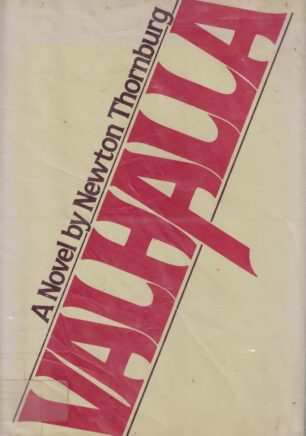 By NEWTON THORNBURG (Little, Brown; 1980)
By NEWTON THORNBURG (Little, Brown; 1980)
The late Newton Thornburg really knew how to write a novel, a fact he proved with 1976’s CUTTER AND BONE, one of my all-time favorites, and again in VALHALLA, possibly the most (undeservedly) obscure of all his books. It’s an end-of-the-world narrative that’s very much in the gloomy, realistic mode of classics like ALAS BABYLON and NO BLADE OF GRASS.
The story is a troubling one, and not just because of the oft-gruesome episodes of perversion and violence. The overriding conceit, of a socio-economic breakdown precipitated by uncontrolled government spending, is a bit too prophetic for comfort these days. It’s also an extremely politically incorrect book, which I found disturbing despite my own better instincts.
Reading VALHALLA’S opening chapters, I wondered if I’d somehow stumbled onto THE TURNER DIARIES REVISITED, what with Thornburg’s descriptions of roving bands of black youth called Mau Mau terrorizing America’s heartland while everybody else scavenges for food and shelter. But the author’s aims are actually far more complex…even if the main story arc, about a liberal pacifist who becomes a fearless killer, is a mite clichéd.
Said liberal is Walter Stone, who finds himself adrift in this world gone mad. Fleeing the brutal murder of a traveling companion, he meets up with the survivors of a plane crash, among them a famous tennis star and his pretty girlfriend (who, needless to add, is destined to become Stone’s future love interest). This rag tag band eventually meets up with a larger group subsisting in a set of lakeside cabins, where they suffer all the expected problems: not enough food or water to go around and a constantly changing set of leaders.
On the other side of the lake is Valhalla, a deserted monastery presided over by a junkman that contains hot water, working electricity and an apparently unlimited supply of food and ammunition. Nearly all Stone’s newfound companions want to infiltrate Valhalla, but they have more pressing matters at hand, namely a band of Mau Mau headed their way.
As always, Thornburg crafts a crisp and compelling narrative. His clean, unadorned prose is a joy to read, his characters fully rounded and his eye for realism utilized to full—and frequently unnerving—effect. The narrative loses quite a bit of its momentum in the middle section, in which Stone and his cohorts schlep around and bicker endlessly in their lakeside retreat, but bounces back in the final 100 pages. Indeed, once the climactic showdown commenced, with the two factions battling for control of Valhalla, I simply COULD NOT put the damn thing down!
